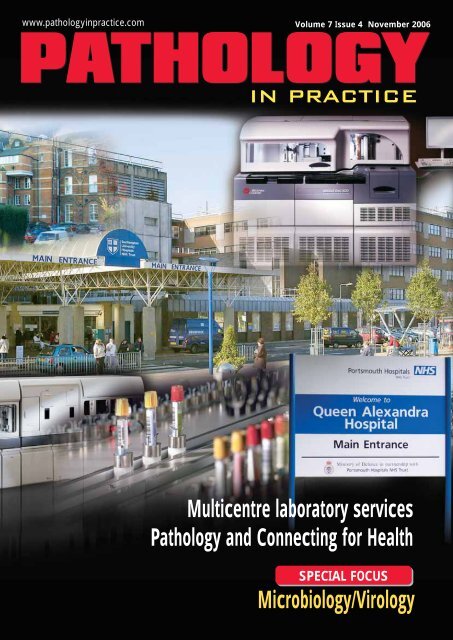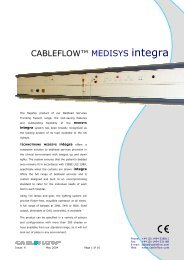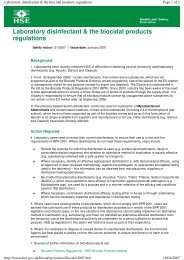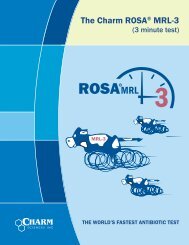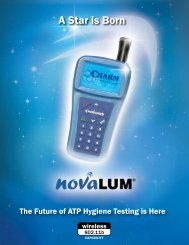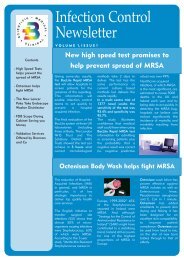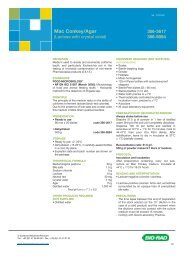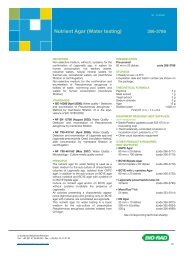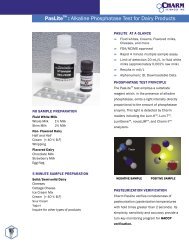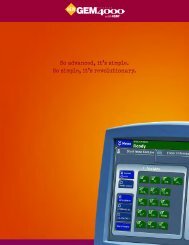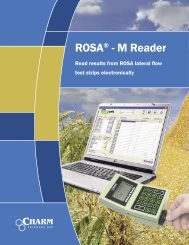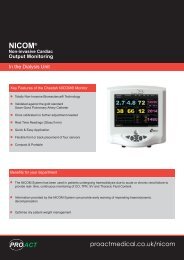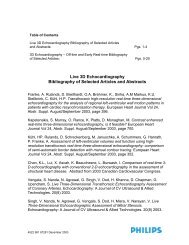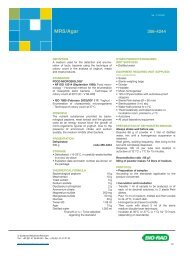Microbiology/Virology Multicentre laboratory services Pathology and ...
Microbiology/Virology Multicentre laboratory services Pathology and ...
Microbiology/Virology Multicentre laboratory services Pathology and ...
- No tags were found...
Create successful ePaper yourself
Turn your PDF publications into a flip-book with our unique Google optimized e-Paper software.
www.pathologyinpractice.comVolume 7 Issue 4 November 2006<strong>Multicentre</strong> <strong>laboratory</strong> <strong>services</strong><strong>Pathology</strong> <strong>and</strong> Connecting for HealthSPECIAL FOCUS<strong>Microbiology</strong>/<strong>Virology</strong>
MULTICENTRE LABORATORY SERVICESAutomation builds<strong>laboratory</strong> networkacross four NHS trustsLaboratories in four trusts across the south-east of Engl<strong>and</strong>carried out a technical evaluation that put service delivery atthe top of the agenda. The result was a seven-year partnership,in the form of a managed service contract, with BeckmanCoulter that provides analysers, pre- <strong>and</strong> post-analyticalautomation <strong>and</strong> after sales service.Laboratory teams in four NHS trustshave played a pivotal role in achievingwhat was said to be one of the UK’slargest automation projects when it wasunveiled earlier this year. Thismultimillion-pound joint procurementexercise involved the PortsmouthHospitals NHS Trust, Royal West SussexTrust (Chichester), SouthamptonUniversity Hospitals NHS Trust <strong>and</strong>Winchester <strong>and</strong> Eastleigh HealthcareNHS Trust.Faster turnaround times, moreconsistent delivery of results, automatedpre-analytical processing <strong>and</strong> anexp<strong>and</strong>ed menu will create one of themost efficient, multicentre <strong>laboratory</strong><strong>services</strong> in the UK. For the two millionpatients served by the hospitalsinvolved, it will mean their illnesses canbe diagnosed <strong>and</strong> treated more quickly.What the laboratories have achieved,collectively, has been described by onesenior hospital manager as "astrengthened pathology network,building on existing relationships, whichcould well be a model for other UKhospital trusts".Service delivery top of agendaAlready h<strong>and</strong>ling 15 million testsbetween them, the individuallaboratories needed to replaceout-of-date equipment urgently.They were facing 2007 workloadspredicted to rise by up to 10%, with nobudget for additional staff. Instead ofviewing themselves as individuallaboratories with separate needs, theyformed a project team designed to avoidduplication of resources. By pooling theirresources, the laboratories recognisedthat they could achieve a dynamicupgrade of facilities while still deliveringthe ‘economies of scale’ required by thehospital.Even before cost was considered,however, the laboratories carried out atechnical evaluation, viewing all the sitescollectively, with service delivery at thetop of the agenda. This evaluation <strong>and</strong>specification benchmarked subsequentfinancial decisions <strong>and</strong> pointed to someinevitable compromises that had to bemade for the greater good of the patients.The result was a seven-yearpartnership, in the form of a managedservice contract, with Beckman Coulter,‘Already h<strong>and</strong>ling15 million testsbetween them, the fourlaboratories needed toreplace out-of-dateequipment urgently’Samples are loaded on the tracking system prior to decapping,centrifugation <strong>and</strong> passage to the attached analysers.2REPRINTED FROM PATHOLOGY IN PRACTICE NOVEMBER 2006
MULTICENTRE LABORATORY SERVICESThis is because turnaround time can beaffected by delays that occur whenreceiving a specimen <strong>and</strong> it beingcentrifuged, or between the end ofcentrifugation <strong>and</strong> then loading theanalyser. The Power Processor withautomated centrifugation <strong>and</strong> trackingwas the solution because it reducesthese delays significantly. "It wasessential that we simplified the entireprocess, not just the analytical stages,from the moment the samples arrive toautomated archiving, with minimal staffinvolvement," explained Phil Biggs, thehospital’s operational manager for<strong>laboratory</strong> medicine.Smaller in size, the district generalhospitals at Winchester <strong>and</strong> Chichesterare also receiving upgraded analysers<strong>and</strong> an automation solution that includesthe pre-analytical processes ofcentrifugation, decapping, aliquoting<strong>and</strong> sorting for analysis.The 400-bed St Richards Hospital,Chichester, mainly h<strong>and</strong>les acuteadmissions. It is rated the leadinghospital for clinical care in the southeastof Engl<strong>and</strong> <strong>and</strong> one of the top inthe UK. Chichester’s challenge was toservice its new Central Treatment Centre(CTC) where the patient receives all theirdiagnostics in one go. High-throughoutanalysers for both immunoassay <strong>and</strong>clinical chemistry were essential if fasterdelivery <strong>and</strong> more predictableturnaround time were to be delivered.The <strong>laboratory</strong> has upgraded to threeDxC 800 clinical chemistry analysers tomake sure it can h<strong>and</strong>le the extraworkload as well as reduce theturnaround time.4‘Manual decapping ofa sample tube canspread potentiallybiohazardmicroparticles as far assix metres’Automate the pre-analyticsClosed-tube sampling, a special featureof the DxC 800, plays its part inreducing turnaround time byautomating a tedious <strong>and</strong> timeconsumingmanual task. By removinglabour-intensive decapping <strong>and</strong>recapping processes, the <strong>laboratory</strong> willcut its operating costs by hundreds ofhours a year. The sample test tubes canbe put directly on the analyser withoutspillage or contamination, protectingthe operator <strong>and</strong> maintaining sampleintegrity.Samples are automatically stored in, <strong>and</strong> retrieved from, the refrigerated stockyard,saving hours of staff time.Manual decapping of a sample tubecan spread potentially biohazardmicroparticles as far as six metres.Closed-tube sampling (CTS) or cappiercing, which is normal practice inhaematology laboratories, is notcommonplace in clinical chemistry <strong>and</strong>immunology departments. BeckmanCoulter is the only diagnosticscompany to offer a range of clinicalchemistry analysers with thistechnology.Winchester had the bigger challenge,opting to exchange its old partialtracking system, which linked toanalysers but without the provision ofpre-analytical automation. The<strong>laboratory</strong> made the change because itsprimary objective was to keep <strong>laboratory</strong><strong>services</strong> functioning at all times withoutreducing turnaround times. Automatingthe pre-analytical stages, includingcentrifugation, was the deciding factor.Over the next two months, bothlaboratories take delivery of the UK’sfirst st<strong>and</strong>alone AutoMate 800 systemsoffering the key benefits of largerautomation systems to laboratories ofvarying sizes <strong>and</strong> workloads. TheAutoMate 800, with a capacity of 500tubes, loads all samples – chemistry,immunoassay, haematology orcoagulation – at one entry point <strong>and</strong>then tracks them throughout theprocess. Normal centrifuge of 3000 xgfor five minutes allows processing forboth coagulation <strong>and</strong> chemistrysamples. The tubes are then sortedimmediately, or aliquoted prior tosorting, depending on the request. Newtubes are loaded continuously, whilecompleted samples can be moved forarchive mapping.Intelligent aliquotingA dedicated ‘priority load’ input areaallows urgent samples to move aheadof the routine workload. Shortturnaround time (STAT) samples flag analert after they are processed. Thesoftware automatically directs samplesaccording to the tests being run by aspecific analyser, diverting those tubesbeing processed at work stations withCTS technology to avoid the decappingmodule. This all helps to ensure fast<strong>and</strong> constant turnaround times.Aliquoting, using a robot to aspirate<strong>and</strong> then dispense the sampleautomatically into two or moreadditional aliquot tubes, offers similarbenefits. Fewer samples need to betaken from patients <strong>and</strong> it avoids delaywhen clinicians call for retesting oradditional tests.Automation improves efficiency,h<strong>and</strong>les larger workloads <strong>and</strong> deliversgreater reliability of results; however, italso underpins the service the modern<strong>laboratory</strong> can deliver, enabling it to playa more direct role in patient care. Bycombining their resources <strong>and</strong> workingas a team, the four laboratories haveforged a network that is likely to addsignificant value to the overall diagnosticservice they provide.PEnquiries should be addressed toJulie Raybould, Beckman Coulter UK,Oakley Court, Kingsmead Business Estate,London Road, High Wycombe HP11 1JU(tel +44 [0]1494 441181,fax +44 [0]1494 463836, emailinfouk@beckmancoulter.com).REPRINTED FROM PATHOLOGY IN PRACTICE NOVEMBER 2006


